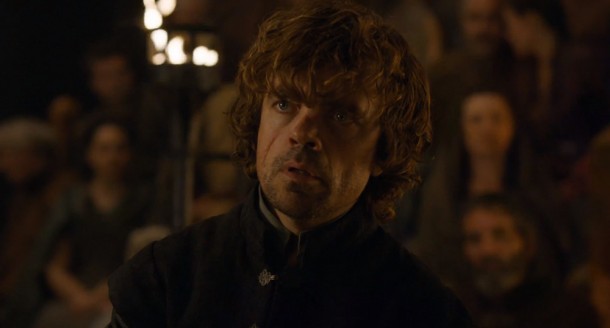
[MASSIVE spoilers throughout. Do not pass GO, do not collect $200 if you haven’t watched the episode.]
No one knows how to play the Game of Thrones.
No one except for Littlefinger and Varys, that is. This episode confirmed and amplified the growing beat of the “no one knows what the hell they’re really doing in Westeros” drum. Everyone considers himself or herself to be in charge of their fates, but in reality they’re just pawns in the giant chess game between the two false Lords. We have Littlefinger on one side representing chaos and Varys on the other representing balance. They’ve had their way with the Seven Kingdoms, and set the rest of the world ablaze as needed. They know the game.
Everyone else is clueless, no matter their stature.
Kings don’t know how to play the game.
As Stannis Baratheon arrives in Braavos begging for gold from the Iron Bank, he relies on “honor” and “rightful claims to the throne” to try and win over the bankers. Instead he gets verbally punched in the nose. Honor can’t pay back the funds. Rightful claims mean nothing when another King sits the throne. He’s down to some 4000 soldiers, a handful of what he had before raiding and losing at the Battle of the Blackwater. He’s desperate and the bankers know it, and they intend to play him before they pay him. The little benches that he’s forced to sit on lessen his power in much the same way that a student feels when going to the Principle’s office.
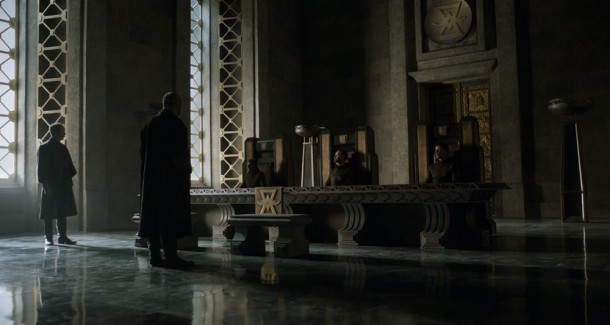
In a way, Stannis’ drive to the throne is a a living snapshot of Westeros. He’s old, frail, failing. He has no food, no trade, no gold. His people are dying, his soldiers are scattering. He’s a living shadow of his former self, of the old world. Westeros is dying.
It isn’t until Davos makes a final plea about the throne and age and actual control, fearing for both his king’s strength and his own life, that the Braavosi bankers led by Tycho Naharis — played by Mark Gatiss, by the way! — seem to agree.
Kings don’t have power in other realms. Smugglers seem to, though. At least a little bit.
Dragons might have power as well, though their mother might not.
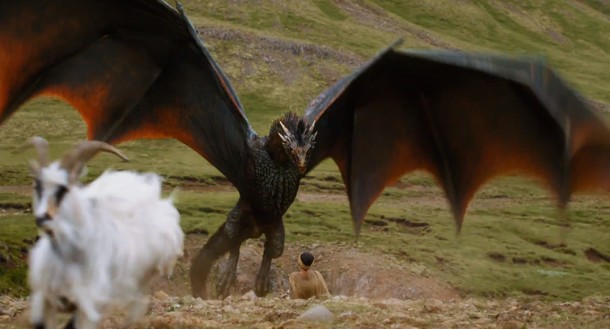
A short snippet of the goings-on in Meereen reveal that Daenerys’ dragons are getting bigger every day, thanks to their hunting of local sheep. After Dany pays off a shepherd who’s lost his herd to the ferocious black Drogon, she meets the well-dressed Hizdahr zo Loraq. Hizdahr’s father was one of the men that Dany had crucified to the posts, and yet he asks her to let his father be buried according to Meereenese rites.
This tells us one important thing that keeps the Mother of Dragons flailing: she’s been trying to enact the laws of Westeros on her voyage east further into Essos. This isn’t working. If she is going to be a true leader, she’ll need to understand that different peoples have different ways of doing things. Her world has been homogenous, but the reality is the opposite.
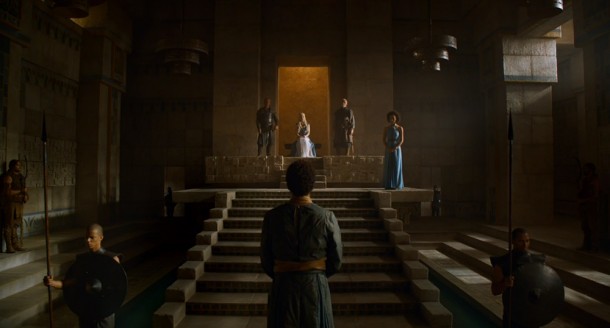
And then there’s Yara. We haven’t heard much from the Greyjoy clan this year, but it’s apparent that the current status is in limbo as Theon is held hostage by Ramsay Snow.
Or is he?
As Yara makes a valiant rescue effort, she finds a decrepit Theon caged in Bolton’s dog kennels. Instead of escaping, Theon seems to be brainwashed, believing it all to be another trick being arranged by Ramsay. He chooses to stay — whether the choice is really his or not — and she leaves, brotherless. “My brother’s dead.” Only Reek remains in his place now, and along with it the hopes for a true Greyjoy heir.
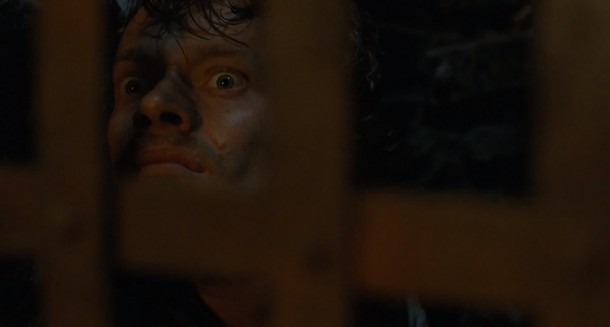
Desperation. Is this what Varys and Littlefinger had in mind? They’ve crippled the realm, and by doing so they’ve managed to hurt several along the way, including their centerpiece (and fan favorite) Tyrion Lannister.
This season is more about Tyrion than anyone else. He’s been both comic relief and sympathetic hero, and we’ve always felt that he knew where his path was going whether we did or not. And yet, this year he’s been quite the bottom of the Westeros food chain. Everything he’s done so far for justice, for love, and for the lives of others has inadvertently been hurting him. His friends are now enemies, and his enemies have fuel to light his funeral pyre a thousand times over.
Not good, Tyrion.
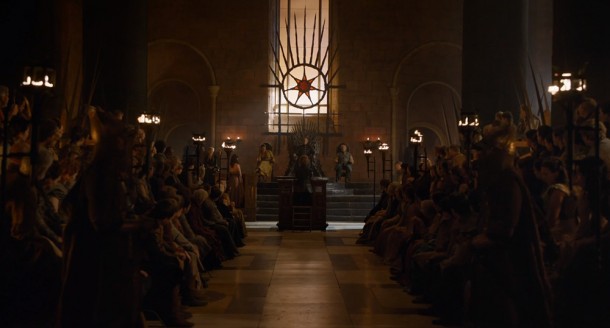
Witness after witness appear at his trial, each of which he’s wronged in some way or another. Cersei, Maester Pycelle, Ser Meryn Trent, and Varys all testify against him. “You said the histories would never mention me, but you would not forget. Have you forgotten, Lord Varys?” Tyrion asks of Varys, in reference to the eunuch’s uneasy friendship towards him and his strange, unknown destiny.
“I never forget a thing,” he replies. If this is Littlefinger’s chaos, where is Varys’ balance?
Throughout the ordeal, Tyrion remains composed and defiant. He’s still being Tyrion, even when everyone else paints him to be one person or another.
But that all breaks when Shae is called to the stand. To his surprise, Shae twists the truth, often lying about what he’s done or said, and it’s convincing. She’s upset that he cast her off so coldly, unknowing that it was for her safety. And because of that we see something nearly as heartwrenching as the Red Wedding. We’re watching a man die. We’re watching our Tyrion, our moral compass of Westeros, get gutted and shred by the one thing that matters most to him: love.
And it’s brutal. BRUUUUUTAL.
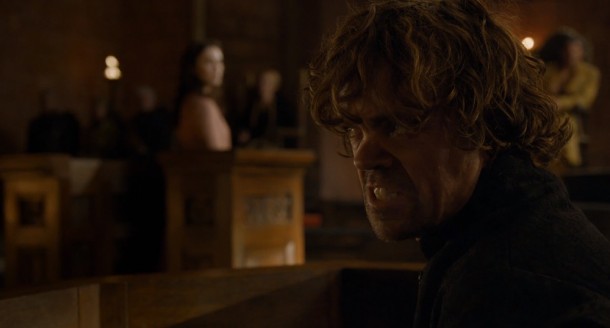
It’s at this point that everything seems to change for the man. Until now, the cards had been dealt against him, but it’s his closing speech that may be one of the most memorable of modern television. His fire is lit, his rage is bursting forth, and when asked if he poisoned the King he snaps and it’s glorious. He holds one final trump card, and contorts his face into the most hideous of ways to deliver his own effigy.
[quote]
“I’m guilty of a far more monstrous crime. I’m guilty of being a dwarf. I’ve been on trial for that my entire life. I did not do it. I did not kill Joffrey, but I wish that I had. Watching your vicious bastard die gave me more relief than a thousand lying whores. I wish I was the monster you think I am. I wish I had enough poison for the whole pack of you. I would gladly give my life to watch you all swallow it.
I will not give my life for Joffrey’s murder, and I know I’ll get no justice here. So I will let the Gods decide my fate. I demand a trial by combat.”
[/quote]
And he caps it off with possibly the most epic staredown in HBO history, his eyes on his wretched father Tywin, a smirk across his face, ready to draw guns like in a Western.
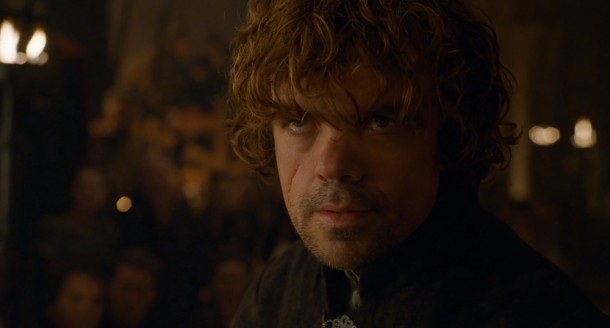
Boom. Attaboy. The buildup to that moment was pivotal: tear a character down, yet let them climb back up stronger and more fearless than ever.
While the game was played around him and through him over the last few years, he may now, finally, understand how to play it himself. This was his declaration of understanding his place in the world; he’s no longer a Lannister, no longer the carefree and lovable Tyrion. He’s playing his first major move on the giant chess board.
Hopefully, he has more moves left.
One more thing I found noteworthy this week: there were a LOT of scenes from behind characters looking up at thrones and tables. The perspectives and shots used were all focusing on judgement, including that of Daenerys looking back down at her Meereenese subjects. She was the one being judged here, not the other way around. We’re past the midway point of the season now, and the judgements laid out here will have vast effects going forward.
All images courtesy HBO

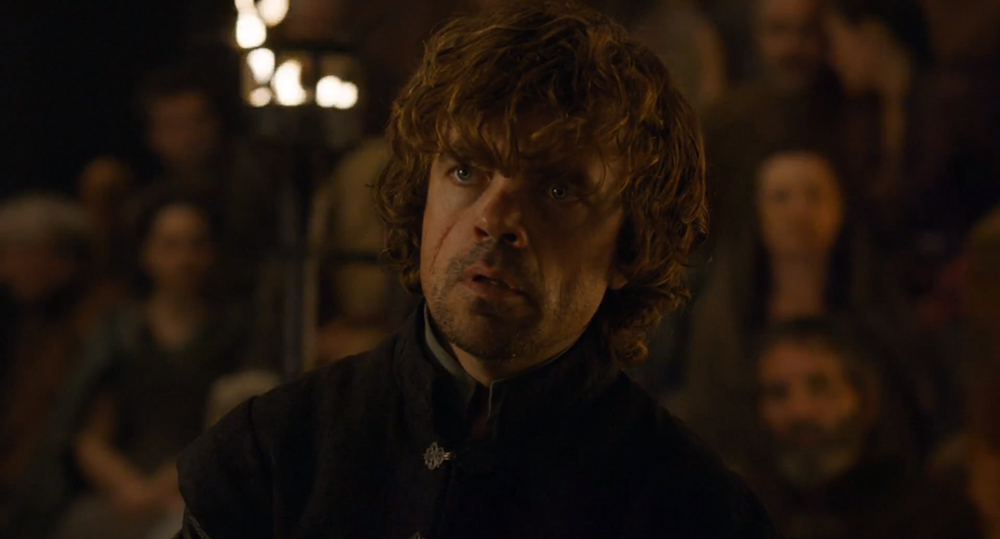
No Comments